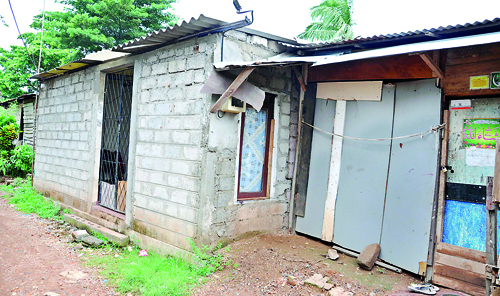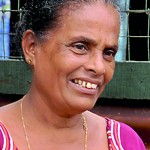News
Innocents tortured in house of shameful secrets
A mother who begged a neighbour for work so she could buy food for her children; a mother who was sad last week because she couldn’t afford to buy a birthday present for her daughter; a mother who this week kicked and strangled the same daughter to death.
Living in flea-ridden hovels right in front of a garbage dump, the residents of Nagahamulla, Kolonnawa are no strangers to the evils that poverty and depression unleash. But this filicide has shocked them all.
And police probing the tragic events behind the death of six-year-old Fathima Zekiya learned this week that the little girl and her brother had suffered horrific abuse for some time.

The house that Jesdiya lived in with her children. Pix by Ranjith Perera
The child’s death comes just a week after a case in which a father dashed his baby daughter against a rock, killing her in revenge for his broken marriage, and there are warnings that child abuse is on the rise.
Now 29-year-old mother, Mohammad Uwais Fathima Jesdiya, is under arrest over the death of little Fathima Zekiya last Sunday.
The arrest followed information given to police by the woman’s seven-year-old son.
Neighbours paint a picture of a poverty-stricken family living in isolation with dark secrets.
M. Kareema, 32, a mother of two, lived next door when Jesdiya’s family came to live in Nagahamulla a year ago.
“The children never came out of their house. Even Jesdiya stayed inside with the door closed at all times. The few times I saw the children was when they came to ask for curry leaves or chillies for their mother,” Kareema said. After Jesdiya’s family moved a couple of doors up the street Kareema barely saw them.
She said Jesdiya – who police learned later had been working in Saudi Arabia for the first four years of her daughter’s life – often complained of hardship. There were times when she lacked the money to buy food for her children. The rent for the house was Rs. 7,000. Her husband worked

L.I. Irangani
at a cleaning service at a monthly salary of Rs. 10,000.
“During Ramadan I started a food business. Jesdiya asked me to hire her to help me for Rs. 150 a day. She bought food for her children from this money,” Kareema said adding that a week ago Jesdiya had found work at a tea factory.
She never looked like someone who would kill her own child, Kareema said. A few days ago, when Zekiya had just turned six, Jesdiya had been sad that she could not buy a present for her little daughter.
Another nearby resident paints a darker picture. R.A.T. Gimhani said she always heard children crying in the house. She said the father and grandfather, who were living in the same house, often hit Zekiya and her brother. She added that the children stayed isolated and did not come out to play with other children.
Last Sunday, 58-year-old L.I. Irangani was watering her flower plants when a young man living close by came shouting that a child was sick.
“It was around 6.45 in the morning. I ran to see what the matter was and saw the child lying limp on her mother’s lap in their veranda. The mother looked devastated and the child had her eyes wide open.
“They called a three-wheeler and the mother got into it with the child. That was the last time I saw Zekiya,” said Irangani.
Zekiya was rushed to the Lady Ridgeway Hospital for Children but pronounced dead on admittance. Her mother informed the hospital officials that the child had slipped and fallen in the house. Initially the case was treated as an accidental death.
Wellampitiya Police received a call from the hospital that morning about the death, said the Officer in Charge, Inspector S. Kalyanathunga.
A police official was sent to assist the post-mortem; it was found that the death was suspicious, and police began investigating.
On Sunday morning, Zekiya had woken up, wanting to urinate. She used to urinate in the house, behaviour that angered her mother.
That morning, when she tried to do the same, Jesdiya had shouted to her to go out to the small toilet situated behind the house. To go to this toilet little Zekiya had to climb down four steps.
Crying, the child had been clambering down these steps when her mother, flying into a rage, had kicked her from behind. Zekiya stumbled down the stairs and began to wail.
Demanding that she stop crying, Jesdiya had lifted the child by the neck and shaken her several times. The crying stopped, and Zekiya ceased all movement.
“Zekiya’s elder brother witnessed this incident. He explained what happened that morning. Later, the mother confessed to the crime. She said that she had wanted to scare the child and stop her from crying. We arrested herthat day,” Inspector Kalyanathunga said.
The police have found burn marks near the pubic area of the child’s body.
“She was burnt in several places. The wounds were still unhealed when we investigated the body. Her brother also had such wounds but those on Zekiya’s body were worse,” Inspector Kalyanathunga said.
The mother is to be produced in Colombo Magistrates Courts on Friday (September 12).
Secretary to the Field Probation Officers Union K.K. Keerthiratne said that cases of parents killing their children, and general cruelty against children are on the rise in Sri Lanka.
He explained that there are more than 450 children’s homes in the country, housing more than 15,000 children. Just 20 are run by the state – the rest are managed by NGOs.
Mr. Keerthiratne said more than 75 per cent of these children were sent to the homes as a result of parental issues including neglect, abuse or children born out of wedlock.
“There are 250 field officers in the country who are members of our union. We receive all information that is collected by these officers. There is a clear rise in child cruelty and we see parents distancing themselves from their children,” said Mr. Keerthiratne, who has been serving as a field officer for the past 18 years.
He said people were seeking answers to their problems through violence.
In Badalkumbura, Monaragala a 13-year-old girl recently stabbed her six-year-old sister to death. She later confessed that she had committed the crime because she suspected that her parents loved the younger sister more.
“These are the stories we hear today. That child was not born violent. It was society that made her so. Domestic violence, absence of a father or mother leaving the country for employment are common factors that lead to child cruelty. We see that juvenile offenders are mostly those who don’t have parental protection,” Mr. Keerthiratne said.
He explained that putting in more resources to solve the problem was not enough.
“The mentality of the people should also be changed. They are more violent now. We hear of parents killing children and then committing suicide as a solution to their problems,” he said.
A study just released by the World Health Organisation (WHO) has rankedSri Lanka fourth among 172 countries in terms of most suicide-prone countries with 28.8 suicides per 100,000 people.
According to statistics by the National Child Protection Authority (NCPA) this year from January to July, 714 complaints of rape, sexual harassment and grave sexual abuse of children were recorded.
The Minister of Child Development and Women’s Affairs, Tissa Karaliyadda, has told parliament that in 2012, 7,418 children had experienced abuse and cruelty. Most cases had been reported in Colombo District. Between 2009 and 2012 there had been 18,777 cases of cruelty against children.
The NCPA stated that most abuse of children was inflicted by a family member or a person known by the family.
The former chairman of the National Child Protection Authority, Professor Harendra de Silva said the level of violence in the country, with apparent impunity, had led to the increase in cruelty to children.
The psychological status of a parent also led to violence, he said.
“For example, if the mother is depressed as a result of poverty or domestic violence she will try to take her anger out on her child. If the mother went through an abusive childhood she would do the same to her child,” he said.
Recent history had also left scars on society. “There are many armed force personal who were involved directly in war who are suffering from post-traumatic stress disorder (PTSD). We hear news of some being involved in violent crimes. The state should look into these matters and provide a solution,” Prof. de Silva said.
He said the media also bore some responsibility for the increase in violence and that it could play a big role in promoting social justice rather than reporting crime for commercial purposes.

